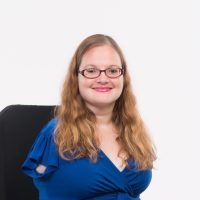Self advocacy: Recognizing your own power

By: Olivia Keller
I am frequently asked how and when I got involved in advocacy. It’s always been a challenging question to answer because having been born with a physical disability I have had to advocate for myself for as long as I can remember. I remember using the phrase, “that’s not fair” a lot as a child. Most kids do, but my “that’s not fair” had a different connotation than the unfairness my peers experienced. My “that’s not fair” wasn’t in response to not getting my way, although I know I had those moments too. A kid with a disability is still a kid after all! But my “that’s not fair” was usually in response to being treated differently than my peers for arbitrary reasons. I just didn’t have the vocabulary as a young child to adequately express that how I experienced unfairness was different than the unfairness usually perceived by my peers.
After having been asked how and when I got involved in advocacy so many times over the years, I started doing some self-reflection, wondering if there was any one particular “that’s not fair” moment that stood out. As I really started to ponder this question, one memory was clearer than the others. One of my first memories is of being at a school board meeting with my grandparents listening to angry parents yelling at school board members because they didn’t want “those kids” attending school with their kids. I remember my grandmother holding me on her left hip. I remember the clothes I was wearing. I remember my grandmother’s shirt that I kept burying my face in whenever the voices in the room got too loud for me. I remember my grandfather standing right behind us in his white striped, short sleeve shirt with his olive-green pants, black belt, and black shiny shoes that he seemed to wear every day. I think I was 3 at the time, but I still understood that when the parents in the room were yelling about “those kids” they meant me.
I can’t say this is my most painful childhood memory. I didn’t have an easy childhood and there are a lot of painful memories looking back on it. However, I think this one carries a particular sting because it was my first realization that I was different, and my life wasn’t going to be “normal.” It was also in this moment that I began to recognize my own power. As I peeked over my grandmother’s shoulder and scanned the faces in the room around us, I began to notice something. Whenever I would make eye contact with someone, they would give me a smile and a little wave, like people often do with toddlers. They would then notice that I didn’t have my arms wrapped around my grandmother’s neck because I didn’t have any arms. Then they would see the plastic brace on my right foot and suddenly they would break eye contact and look down at their feet like they were embarrassed or ashamed. I noticed that the more people I engaged in this little exercise the quieter it got in the area of the room where we were standing. As it got quieter, I began to lift my head higher and as I did so the people around us began to see that I wasn’t the monster they thought would be sitting in the classroom with their kid; I was just another kid.
As I got older, I began to use my voice to silence rooms the same way I had done with just a look at the school board meeting years ago. When I entered high school, I joined the school paper and wrote editorials about the school’s inaccessibility and about how having a one-on-one paraprofessional I didn’t need follow me around all day was more isolating than integrating. In college, I worked with a friend who was a reporter on the University paper to do a front-page expose about the accessibility issues on campus, much to the consternation of the University President.













